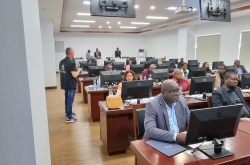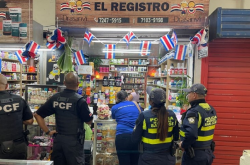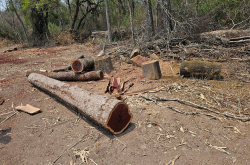LYON, France - One of Guinea Bissau’s largest cocaine seizures has resulted in the sentencing of three drug kingpins arrested during a police operation supported by INTERPOL.

An INTERPOL Incident Response Team (IRT) deployed to Guinea Bissau last March helped local authorities investigate a record 790 kg cocaine seizure where four suspects from Nigeria, Guinea Bissau and Senegal were arrested.
The resulting three 14-year prison sentences – a record in Guinea Bissau – coincide with a significant rise in the use of INTERPOL capabilities and anti-drug expertise recently. All three sentenced men were foreign nationals.
“Guinea Bissau’s increased number of cocaine seizures and harsher sentencing over the past 18 months clearly demonstrates that the country will no longer tolerate the international drugs trade using its territory to ship cocaine from Latin America to the rest of the world,” commented Paul Stanfield, INTERPOL's Director for Organized and Emerging Crime.

“Ensuring Guinea Bissau police have the knowledge and skills required to prevent, investigate and disrupt drug trafficking is a key part of INTERPOL’s global drug strategy,” added Mr Stanfield.
Stronger law enforcement
INTERPOL provides Guinea Bissau with a multi-disciplinary and joint agency approach combining investigative support and capacity building, working on the ground to help police share intelligence and conduct operations against drug trafficking.
“With drug trafficking contributing to instability in places where insurgent groups operate, tougher sentencing and zero tolerance policies are a must for the wellbeing of West Africa’s governance, economy, stability and public health,” said Head of INTERPOL’s National Central Bureau in Bissau, Cornella Florinda Vieira Te.
“Weak law enforcement provides opportunities for drug crime to go undetected: with INTERPOL, Guinea Bissau is stronger, because in developing our counternarcotic capacity INTERPOL has also strengthened our criminal justice system,” added the NCB Head.
Transforming external funding into operational results
INTERPOL’s five-year AMEAP project (Africa-Middle East-Asia Pacific) coordinates initiatives against drug trafficking with funding by the United Arab Emirates and INTERPOL Foundation for a Safer World.
AMEAP provides Guinea Bissau with a coordination platform for a range of anti-drug trafficking initiatives aimed at boosting investigations and strengthening prosecutions by helping local police detect, identify and arrest drug traffickers.
Project CRIMJUST supports 12 countries in Latin America, the Caribbean and West Africa to counter organized crime along cocaine trafficking routes. CRIMJUST is managed jointly with the UNODC and Transparency International and funded by the European Union

INTERPOL’s Criminal Networks unit (CNET)
INTERPOL enables Guinea Bissau to identify security threats and tackle organized crime groups engaged in illicit drug trafficking through the provision of tailored operational support, drug crime analysis and training services.
Its access to INTERPOL’s global policing capabilities, including I-24/7, its secure communications system, removes Guinea Bissau from its geographic isolation, linking it instead with law enforcement in 194 member countries, which gives it a global perspective on local drug data.
Through INTERPOL’s Drugs Analysis File, Guinea Bissau has access to timely, accurate criminal intelligence so it can detect drug crime trends and adapt activities and policies accordingly.
A regular user of INTERPOL’s ‘Relief’ database, Guinea Bissau can now identify the origin and routes of drug shipments through an automated comparative analysis of the tool-marks, logos and chemical compositions of drug packages.
Countries involved
Related news

Border security threats focus of STOP operations in Africa
8 December 2023






